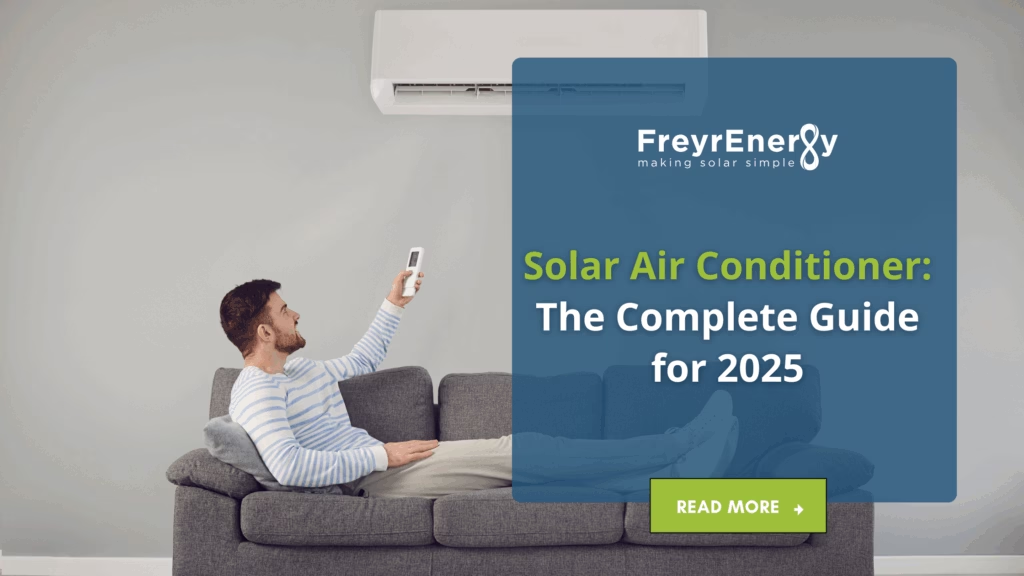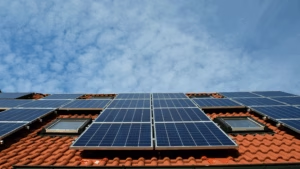
The Growing Demand for Energy-Efficient Cooling
The availability and affordability of clean energy are improving daily and consumers have become increasingly interested in energy-efficient appliances, such as the solar air conditioner for home. Consumers are being introduced to the aspect of reducing more than cooling; they can reduce their energy bills while decreasing their carbon footprint. These systems provide the advantage of both comfort and sustainability as they are powered by solar panels. This is the reason customers have begun looking at options available to them in a country like India, where there is no shortage of sunshine!

Benefits of Switching to a Solar Air Conditioner
Solar powered air conditioner has both short- and long-term benefits:
· Less Electricity Charged: Solar minimizes your reliance on the grid.
· Lower Your Carbon Footprint: Less carbon emissions, cleaner energy.
· Low Maintenance Required: The equipment last a long time with little upkeep.
- Power Backup Support: Helps prevent cooling disruptions during power cuts.
- Strong ROI: Payback typically within 4–6 years with 20+ years of savings.
What is a Solar Powered Air Conditioner and How Does It Work?
In essence, solar powered air conditioner system is simply an air conditioning system that uses energy generated by solar panels. The solar panels collect the sunlight and convert it into electricity.The electricity will run the AC or charge batteries that can be used later. A solar powered air conditioner is using a modern air conditioning system with renewable energy technology for a cheaper and less impactful way of cooling.
How Solar Panels Power Your Air Conditioning System
Solar panels generate direct current (DC) electricity, which is converted to alternating current (AC) using an inverter—allowing your air conditioner to operate seamlessly. Depending on your system design, excess energy can also be stored in batteries or fed back to the grid (in hybrid systems), offering flexibility and uninterrupted cooling.
Choosing the Right Solar Air Conditioner for Home Use
Solar air conditioners for home have a wide range of differences, conditions, and capabilities. Here are some things to think about when choosing the best solar air conditioner for home.
Important Considerations for Residential Installations
· Cooling Capacity (BTUs): Select the cooling capacity according to your room size and the level of insulation to make sure your solar air conditioning system covers your needs.
· Energy efficiency ratio (EER): The higher the EER the less energy required.
· Battery Backup: Backup batteries are extremely important for night time performance and cloudy days.
- Roof Space: Sufficient space is needed to install solar panels for ac unit.
- Inverter Compatibility: A good inverter ensures stable energy conversion.
Best Models and Features to Look For
Look for air conditioners that are:
- Compatible with solar inverters
- Supported by major brands with a 10–12 year warranty
- Enabled with smart controls for better efficiency
- Certified for energy efficiency
Solar Air Conditioner Price: What You Need to Know
Cost Factors: Equipment, Installation, and Incentives
The price of a solar air conditioning system depends on:
- Type of solar system
- Size and tonnage of the AC unit
- Number of solar panels required
- Battery and inverter costs
- Installation and maintenance
In India, a complete solar-powered AC setup ranges from ₹1.2 lakh to ₹3.5 lakh depending on capacity and brand.
ROI and Long-Term Savings
You’ll spend more upfront, but you typically recoup that investment in about 4-6 years through lower electricity bills. Considering that solar systems last for up to 25 years, the savings is significant. Plus, there are government rebates and incentives that put extra money back in your pocket.
Matching System Size with Cooling Needs
A 1.5-ton air conditioner requires around 1.5 to 2 kW of solar power per hour.
Daily usage and sunlight availability determine how many solar panels for the air conditioner you need.
Use online calculators or consult an expert for accurate sizing.
Using Solar Panels for AC Units Efficiently
Proper panel placement is key. Orientation, tilt angle, and geographic location directly affect performance. In many cases, panels used for household loads can also power the AC, optimizing system cost and improving overall solar ROI.
Conclusion: Is A Solar Air Conditioner Worth It in 2025?
Absolutely, In 2025, switching over to a solar powered air conditioner for home unit for sustaining your air conditioning choices is a little more than making the sustainable choice. The economics are much simpler by operating at cost below conventional air conditioning whether it is a solar air conditioning unit for home use or a portable solar air conditioner used for traveling. With a solar air conditioning system, you are relying less on the expensive electrical grid, reduce personal electrical costs, and significant reduction in burning fossil fuels.
Solar air conditioning systems are now more easily installed and utilized due to improved technology, lower cost panels, and growing attention to the limitations of fossil fuels. You cool your space while freeing your space from an unsustainable future.
If you are tired of your rising energy costs and want new, cleaner, and more intelligent ways to stay cool, you might as well start today. Invest in a solar powered air conditioning unit today so you are cool tomorrow while making your world greener. Make the change now!
Frequently Asked Questions
It uses solar panels to convert sunlight into electricity, which powers the air conditioning unit directly or through battery storage.
Yes, especially with the right system size and battery backup for uninterrupted cooling.
Lower electricity bills, reduced carbon footprint, and independence from grid power.
Yes, they offer long-term savings and pay back their cost in 4–6 years.
It can cut AC-related electricity costs by up to 80–90%, depending on usage and system size.
They require compatible solar panels, inverters, and professional installation for optimal performance.
Installation typically costs between ₹1.2 lakh to ₹3.5 lakh in India, depending on capacity and features.
Yes, though efficiency may vary; battery backup helps in low-sunlight areas.
A 1.5-ton AC generally needs 1.5–2 kW of solar power, requiring 4–6 standard panels.

